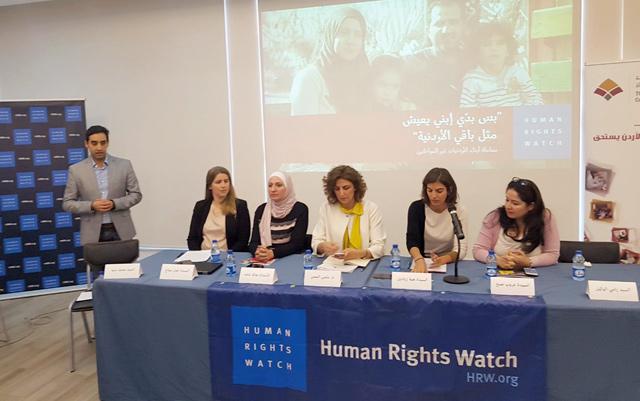You are here
Children of Jordanian women and non-Jordanian fathers ‘still struggle for basic rights’ — HRW
By Rana Husseini - Apr 24,2018 - Last updated at Apr 24,2018

Women rights advocates and Human Rights Watch representatives meet the press to release a report on non-Jordanian children of Jordanian mothers in Amman on Tuesday (Photo by Rana Husseini)
AMMAN — Children born to Jordanian women and non-Jordanian fathers still struggle to obtain basic rights and services in the Kingdom, Human Rights Watch (HRW) said in a report released on Tuesday.
Due to a law that denies women the right to pass citizenship to their children on an equal footing with men, these children are treated as foreign nationals their entire lives, with no permanent right to live or work in the country, HRW said during a joint press conference with the Jordanian National Commission for Women (JNCW).
“This is one of the women movement’s main demands as the current laws are strictly discriminatory against Jordanian women,” JNCW Secretary General Salma Nims stressed, noting that some of the obstacles facing these families include difficulties to obtain work permits.
“The government offered around 200,000 Syrian refugees unconditional work permits, while around 300,000 members of Jordanian families whose fathers are not Jordanians have to go through several hurdles and long procedures before obtaining a work permit. Where is the justice here for our children?” Nims asked.
At the press conference, HRW released the 64-page report entitled “I Just Want Him to Live Like Other Jordanians: Treatment of Non-Citizen Children of Jordanian Mothers”, in which the watchdog details the ways Jordanian authorities restrict the rights of non-citizen children of Jordanian women to work, own property, travel from and return to Jordan, enroll in higher education and access government healthcare and other services.
The report was based on over 50 interviews with Jordanian women, non-citizen children, government officials and activists, as well as a comprehensive review of the relevant Jordanian laws, regulations and decisions.
“By preventing women from equally passing nationality to their children, authorities are forcing hundreds of thousands of children into a life of near destitution,” said HRW Middle East Director Sarah Leah Whitson in a press release, adding that the “announced reforms have failed to meaningfully improve their lives, proving that half-measures are no alternative to citizenship”.
In 2014, the government had pledged to ensure the proper application of the “privileges” the government had granted to children of Jordanian women, provided that their mothers had been living in Jordan for a minimum of five years, for at least 180 days per year.
These included the rights to residency permits, applying for a driving licence and owning property, as well as educational, health, labour and investment services.
But HRW and local activists have insisted that the “privileges” that are expected to ease restrictions “had fallen far short of expectations”.
The multiple forms of exclusion and discrimination non-citizen children face often lead to severely diminished prospects for future and place undue economic and social burdens on their families, the HRW and local activists claimed.
When the government announced the “privileges” almost three years ago, then interior minister, Hussein Majali, said that all 355,923 children of Jordanian mothers and foreign fathers registered with the Civil Status and Passports Department would benefit from the decision, HRW said. But by February 2018, authorities had “issued just over 72,000 special ID cards, fewer than 20 per cent of those eligible”, according to HRW.
In addition, some people are still not able to obtain their identification cards because they are unable to meet the long list of required documents or afford the financial cost to have them issued, said Hiba Zayadeen, the author of the HRW’s report.
“Others are refused because of the requirement that their mothers have to legally reside in Jordan for at least five years before they apply and in some instances they endure some JD700 to get the official ID that is only worth JD3,” according to Zayadeen.
Individuals and entities who oppose granting citizenship to family members of these women, particularly those with Palestinian husbands, say the measure will only lead Israel to implement its “ultimate plan of creating a substitute homeland for Palestinians in Jordan”.
Palestinians, except Gazans, who became refugees after the creation of Israel on Palestinian land, and those who were living in the West Bank when it was occupied by Israel in 1967, have been granted Jordanian citizenship.
However, activist and lawyer Hala Ahed said this was a “weak excuse because offering the Jordanian citizenship to Palestinians who are waiting for the right of return does not mean that they abandoned their rights”.
“Even if the Palestinians in this case get the Jordanian citizenship, they still have the full legal right to return to Palestine. This excuse by the entities that oppose our efforts is not justifiable,” Ahed said.
Aroub Soboh from “My Nationality is the Right of My Family” stressed at the end of the press conference that demands of full citizenship rights for spouses and children of Jordanian women would continue.
“Our position is clear. We want full citizenship for families of Jordanian women married to non-Jordanians, and we will never back up from our original demands,” Soboh said.
Related Articles
AMMAN — Activists on Tuesday said a recent decision by the Cabinet to cancel a condition stipulating that Jordanian women married to non-Jor
AMMAN — Activists on Tuesday lashed back at a Cabinet decision a day earlier to grant investors Jordanian citizenship or permanent residency
AMMAN — Activists on Wednesday stressed that citizenship rights for families of Jordanian women married to non-Jordanians remain a major dem











